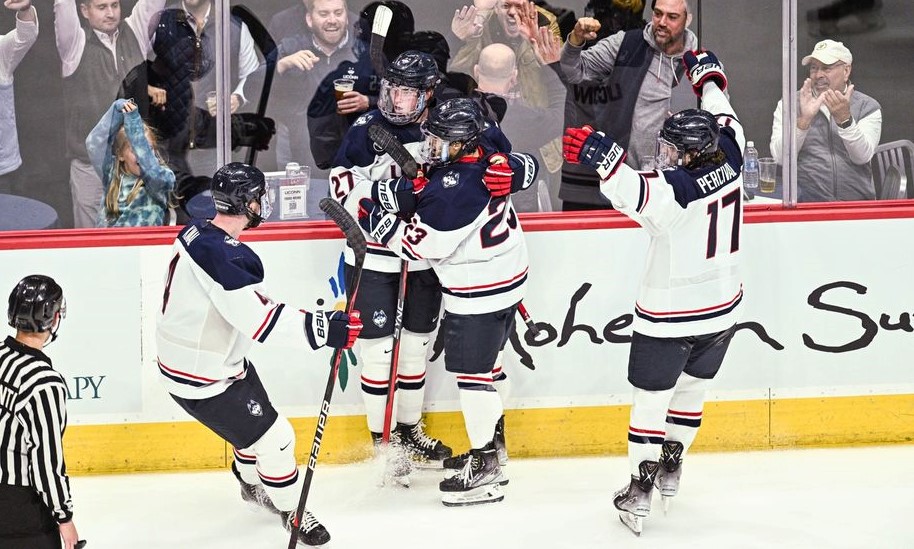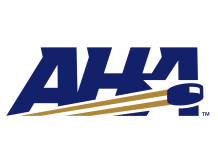
Each week during the season, we look at the big events and big games around Division I men’s college hockey in Tuesday Morning Quarterback.
Dan: The sun is shining, it’s 70 degrees out, and I can’t decide if I want to golf or go watch hockey…must be November in New England!
It’s great to be back this week with you, Jimmy, and I hope that by the end of this, I’ve given you enough quality hot takes that you’re willing to come help me with the leaves that I absolutely have not done in my front driveway. It’s kind of an issue right now.
As we dive in here, I wanted to start off on a different note than most weeks because I learned something this week at Bentley. Friday night’s game against Niagara started with a two-minute minor against the home side for a protocol violation. Apparently, Bentley didn’t get off the ice quickly enough at the end of pregame warmups, and officials tagged the team with a two-minute bench minor. Less than a minute into that, Niagara scored and was off and running with a game that finished with a decidedly-lopsided final tally.
I didn’t know about this rule, and truthfully, the only time I’ve ever seen a pregame penalty occurred a long time ago, when the national anthem ran long. The time clock on the scoreboard ran out, and I vaguely remember the officials giving the home team a two-minute minor. It’s been long enough that I can’t even recall the opponent, the details, or if I even witnessed it happening (meaning it might have been a fever dream or something).
I want to start here because my understanding is that it’s a point of emphasis this year, and I don’t personally agree with it. Warmups are so mundane, I guess, and to call a penalty there absolutely impacts the game. I don’t blame the officials if it’s a point of emphasis, but I still don’t love it.
To you I ask, have you ever seen something like this before, and are we going to live in a world where a team that’s slow to get off warmups by five seconds loses a game that ultimately costs it playoff positioning or worse?
Jim: Okay, we are heading into a rabbit hole to begin this week, but I will bite.
I couldn’t disagree with you more. If you place a new rule in the rule book (that received support of the rules committee and, by extension, the coaches) AND it is made a point of emphasis, players should be hyper aware of the rule.
Every building in NCAA hockey is required to sound the buzzer with 24:00 remaining on the countdown clock. So every single player on the ice is aware they have 60 seconds to get off the ice. No excuses, none. Zero.
I personally haven’t spoken to the rules committee about WHY this rule was going to be emphasized this season. I am guessing there is a solid reason that likely involves player safety. Just comply.
Is that really difficult?
Dan: That’s my greater point – the why. I don’t like the ruling, but I don’t blame the officials in this instance when they have to enforce a rule.
I said something similar a few years ago when some rules gained greater enforcement and a game I attended took over three hours with a dozen-plus penalties per team. I want to at least make that clear as people formulate their own thoughts because I think on-ice officiating is a thankless job. I don’t have to like the enforcement, but it’s not usually the fault of the on-ice people why something gets called more and more frequently. I won’t give them any type of cannon fodder there.
I will say this, I at least feel better for having aired my disagreement with the rules, and I’m sure the NCAA will take my thoughts into serious consideration before the year’s over…
Moving onto the actual hockey from this past weekend, we saw a number of really good series, and almost all of them finished with splits across the board. Parity, to me, is an overused term that I’m guilty of overusing, but when we’re talking about the top teams in the nation, the differences between them are slim to none at this point. There’s a ton of good hockey being played, and this weekend really indicated and highlighted how razor-thin the margin is between those teams.
Jim: Parity is wonderful but, as you said, overused. So at this point in the season, the teams that catch my attention are teams that walk away from weekends with two wins.
Minnesota (now back at No. 1), Providence, Northeastern, Merrimack, RIT, Michigan State (impressive crushing of Wisconsin), UMass Lowell, Harvard. All of those schools jump off the paper to me. I know there were a few others that swept (go Lindenwood!)
I get that splits can be meaningful, particularly the St. Cloud State and Denver series this weekend. I just really feel to move the needle this time of year, you need to get wins.
Dan: To this, I think we’re in agreement, and it’s a big reason why I voted for Connecticut as the No. 1 team in the nation. I was the person who voted UConn into the top spot last week, and even though I wasn’t in this space last week, I want to dial back and go over the reasons why I think they’re worthy of the best spot in the country at this point.
I tend to look at my poll from the week before and measure a team on head-to-head value against one the team in the spot above it. It takes a little bit of time, but the measurements allow me to force teams to work up the polls instead of making huge jumps. If someone does make a massive jump, it’s because they won out in the comparison after the weekend.
Almost every team in front of UConn lost at least one game during that weekend, but the Huskies creamed Boston College in the only game they played. As I compared one team against one another, they consistently won the head-to-head matchup until I got them into the top three spots against Michigan and Denver, who I didn’t love in the top spot. At that point, I kept trying to find holes in UConn, and I couldn’t find any. So I put UConn into the No. 1 spot.
The Huskies weren’t perfect this past week, but I wouldn’t move a team that split its weekend series over a team that I already had in the No. 1 spot and had swept its opponent. Ultimately, as the season progresses, it’ll show up if UConn isn’t the best team in the country, but you’d be hard-pressed to find a team playing better hockey.
I want to cycle back to Lindenwood in a second after that sweep that you mentioned, but that’s where my head goes when we talk about parity. Yes, Michigan and Penn State played some phenomenal hockey against one another, but I pegged UConn as the better team this week. In a couple of weeks, it’s going to look somewhat different, but I think that general consensus is why we’re starting to see more teams gain first-place votes.
We’re also starting to see situations like Penn State, where the Nittany Lions have more first place votes than Connecticut but rank behind them in the poll, meaning there’s a wider, more robust range of opinions on their slotting based on their own criteria.
Jim: I guess all of this is why so many weeks I have a difficult time with my own poll ballot. I always have an idea of which team should be No. 1. I also usually have a feel for what teams should rank where.
But this week I was delivered a conundrum when trying to rank Providence and UMass. It should be a slam dunk that Providence, after sweeping a two-game series against the Minutemen, would be ranked ahead.
Then I looked at what that would take. I dropped UMass from fifth to ninth with the two losses. But I couldn’t justify that sweep moving Providence from 14th to eighth. So I had UMass at 9 and Providence at 10.
Counterintuitive? Yes. Did it make sense in my mind? Yes, also.
Maybe now we know why coaches hate polls.


